How is Disney Animation or the Disney Company in general doing in this timeline? How has either changed from their state in 1980 IOTL?I meant suggestions on animation. But I'll take any ideas anyone has!
You are using an out of date browser. It may not display this or other websites correctly.
You should upgrade or use an alternative browser.
You should upgrade or use an alternative browser.
Blue Skies in Camelot (Continued): An Alternate 80s and Beyond
- Thread starter President_Lincoln
- Start date
Nice stuff! That’s good for India.No Emergency?
Epic Gamer Win!
There have been a few different films after Walt’s death in 1966, but besides that not much else has changed so far, but that might start to change very soon!How is Disney Animation or the Disney Company in general doing in this timeline? How has either changed from their state in 1980 IOTL?
Here comes dat Oil Shock!Next Time on Blue Skies in Camelot: War in the Middle East!
I would sure hope so. Disney is just rife for so many potential changes.There have been a few different films after Walt’s death in 1966, but besides that not much else has changed so far, but that might start to change very soon!
Indeed! Especially with the different presidents and social changes coming in now!I would sure hope so. Disney is just rife for so many potential changes.
great chapter. Nice summary of major world events. Glad to see Amin pay for his crimes and not just be exiled. Glad Yugoslavia is becoming more Liberal. Nice to see Gandhi not be assassinated and her efforts have a positive effect on India. And I cannot tell you how happy I am that Mugabe lost the 1980 election. That man and Amin were the wrist of the worstChapter 138 - Enola Gay - More Events from Around the World in 1980Above: Idi Amin, 3rd President of Uganda from 1971 - 1979, widely considered one of the most brutal despots in history (left); one of twenty-one nuclear weapons tests performed by the Soviet Union in 1980 (center); Lazar Koliševski, 2nd President of the Socialist Federal Republic of Yugoslavia (right).
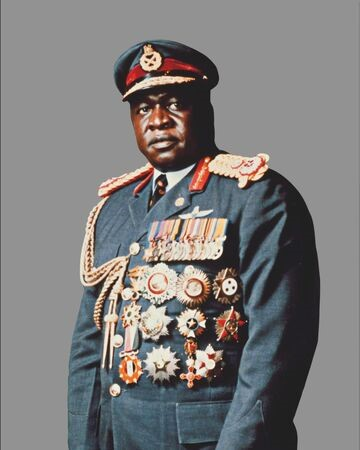
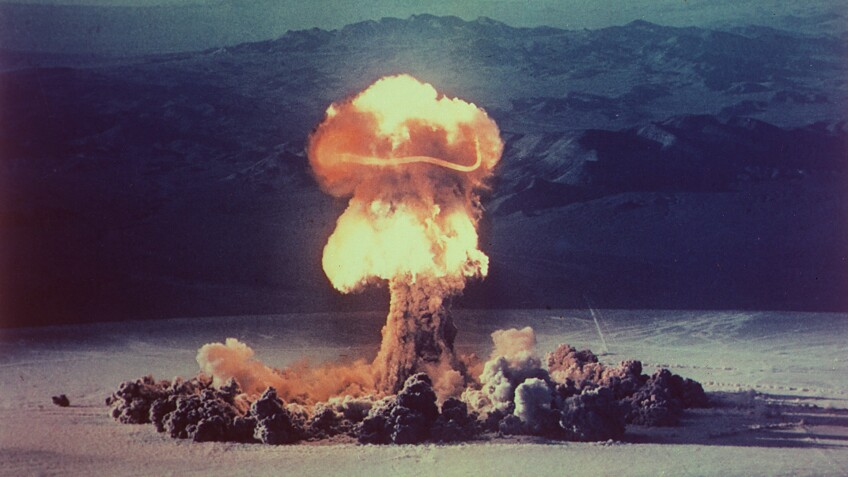
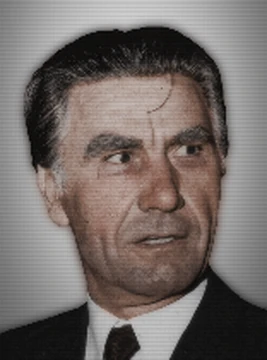
“Enola Gay
You should have stayed at home yesterday
Ah-ha, words can't describe
The feeling and the way you lied
These games you play
They're going to end in more than tears some day
Ah-ha Enola Gay
It shouldn't ever have to end this way” - “Enola Gay”, Orchestral Manoeuvres in the Dark
“None of our republics would be anything if we weren't all together; but we have to create our own history - history of United Yugoslavia, also in the future.” - Josip Broz Tito
“I am the hero of Africa.” - Idi Amin
Idi Amin Dada Oumee was a Ugandan military officer and politician who served as the third president of Uganda from 1971 to 1979. Throughout his presidency, he ruled as a military dictator and is considered one of the most brutal despots in modern history.
Unpacking the infamy of Amin is difficult, given the many tall-tales told about his time in power. This chronicle will delegate this to other sources. Instead, it will focus on a brief recounting of the man’s ascent to power and his downfall.
Amin was born in Koboko in what is now northwest Uganda to a Kakwa father and Lugbara mother. In 1946, he joined the King's African Rifles (KAR) of the British Colonial Army as a cook. He rose to the rank of lieutenant, taking part in British actions against Somali rebels and then the Mau Mau Uprising in Kenya. Uganda gained independence from the United Kingdom in 1962, and Amin remained in the army, rising to the position of major and being appointed commander of the Uganda Army in 1965. He became aware that Ugandan President Milton Obote was planning to arrest him for misappropriating army funds, so he launched a coup d'état in 1971 and declared himself president of the country.
Affectionately nicknamed “Big Daddy” by his supporters, Amin was also known by many, many names by his enemies. These included: “kijambiya” (“Machete”); “Butcher of Uganda”; “Butcher of Africa”; “Butcher of Kampala”; and “the Black Hitler”.
During his years in power, Amin shifted from being a ruler aligned with the West, enjoying considerable support from Israel, to being backed by Libya's Muammar Gaddafi, Zaire's Mobutu Sese Seko, the Soviet Union, and East Germany. In 1972, Amin expelled Asians, a majority of whom were Indian-Ugandans, leading India (then under Prime Minister Indira Gandhi) to sever diplomatic relations with his regime. In 1975, Amin became the chairman of the Organization of African Unity (OAU), a Pan-Africanist group designed to promote solidarity among African states. Uganda was a member of the United Nations Commission on Human Rights from 1977 to 1979, a position which attracted widespread condemnation in the United States and elsewhere given Amin’s horrific record in that arena.
The United Kingdom broke diplomatic relations with Uganda in 1977, and Amin declared that he had defeated the British and added "CBE" to his title for "Conqueror of the British Empire". His full self-bestowed title ultimately became: "His Excellency, President for Life, Field Marshal Al Hadji Doctor Idi Amin Dada, VC, DSO, MC, CBE, Lord of All the Beasts of the Earth and Fishes of the Seas and Conqueror of the British Empire in Africa in General and Uganda in Particular", in addition to his officially stated claim of being the uncrowned king of Scotland.
Amin became the subject of many, many rumors, including a widespread belief that he was a cannibal. Amin reportedly also boasted that he kept the decapitated heads of political enemies in his freezer, although he said that human flesh was generally "too salty" for his taste. The truth of these rumors, or the extent to which they are true, is still debated by historians today.
During Amin's time in power, popular media outside of Uganda often portrayed him as an essentially comic and eccentric figure.
Julius Harris emphasized Amin's allegedly clownish side in Victory at Entebbe, while Yaphet Kotto (who would go on to find far greater fame playing Lando Calrissian in The Empire Strikes Back) drew more praise for projecting Amin's sinister nature in Raid on Entebbe. In a 1977 assessment typical of the time, a Time magazine article described him as a "killer and clown, a big-hearted buffoon and strutting martinet". The comedy-variety series Saturday Night Live aired four Amin sketches between 1976 and 1979, including one in which he was an ill-behaved houseguest in exile, and another in which he was a spokesman against venereal disease.
Though generally mocking, these depictions, according to Ugandan exiles and survivors of Amin’s reigns of terror, did little to represent the dictator’s brutal, bloodthirsty nature. They argued that these depictions in Western media often downplayed the severity of Amin’s crimes against humanity. Thankfully, those would, in the end, be prosecuted.
As Amin's rule progressed into the late 1970s, there was increased unrest against his persecution of certain ethnic groups and political dissidents, along with Uganda's very poor international standing due to Amin's support for the terrorist hijackers in the so-called “Operation Entebbe”. He then attempted to annex Tanzania's Kagera Region in 1978. The Tanzanian president - Julius Nyerere - ordered his troops to invade Uganda in response. Tanzanian Army and rebel forces successfully captured Kampala in 1979 and ousted Amin from power.
Amin attempted to flee into exile in Libya, where he hoped to live as a guest of his old ally Gaddafi. His plans were intercepted by agents of British Intelligence, however, who passed them along to the International Criminal Court in the Hague. There, charges were drawn up against Amin for crimes against humanity. Among these were political repression, ethnic persecution, extrajudicial killings, as well as nepotism, corruption, and gross economic mismanagement. International observers and human rights groups estimate that between 100,000 and 500,000 people were killed under his regime, making him a prime candidate for trial in the Hague. Warrants were drawn up for Amin’s arrest and handed off to INTERPOL.
An issue presented itself, however. Would Muammar Gaddafi - the so-called “Mad Dog of the Middle East” - turn on his fellow dictator and allow him to be extradited to Europe? Gaddafi’s relationships with the United States, United Kingdom, and Israel in particular were terrible. If any of these countries reached out to lead the negotiations with Gaddafi, they seemed bound to fail.
To try and get around this, British Prime Minister Denis Healey and Dutch PM Dries van Agt reached out to French President Francois Mitterand, and implored France to approach Gaddafi. Given that Gaddafi’s government purchased most of its arms from France and the Soviet Union, and that Gaddafi was likely to see Mitterand as a “fellow Socialist”, the negotiations to extradite Amin might be more likely to succeed. Mitterand agreed. After several weeks of tense, top secret negotiations, Gaddafi and Mitterand’s representatives came to an agreement: in exchange for a financial aid package and a shipment of modern military equipment (including LRAC F1s - reusable rocket launchers and artillery shells), Gaddafi agreed to betray his old friend and fellow dictator.
So it was that in June of 1979, Amin was apprehended by Libyan police and agents of INTERPOL at Gaddafi’s residence in Benghazi. He was said to be “shocked” by the officers who arrested them. Amin had thought himself “invincible” for so long, that he did not know how to process being placed under arrest. He was extradited to the Netherlands where he would be held until his trial in the Hague could be completed. It was shortly thereafter.
Found guilty of his crimes against humanity, Idi Amin was sentenced to life imprisonment in 1982. He would serve his sentence until passing away from kidney failure on August 16th, 2003 at the age of either 77 or 78 (his date of birth is difficult for historians to pin down).
…
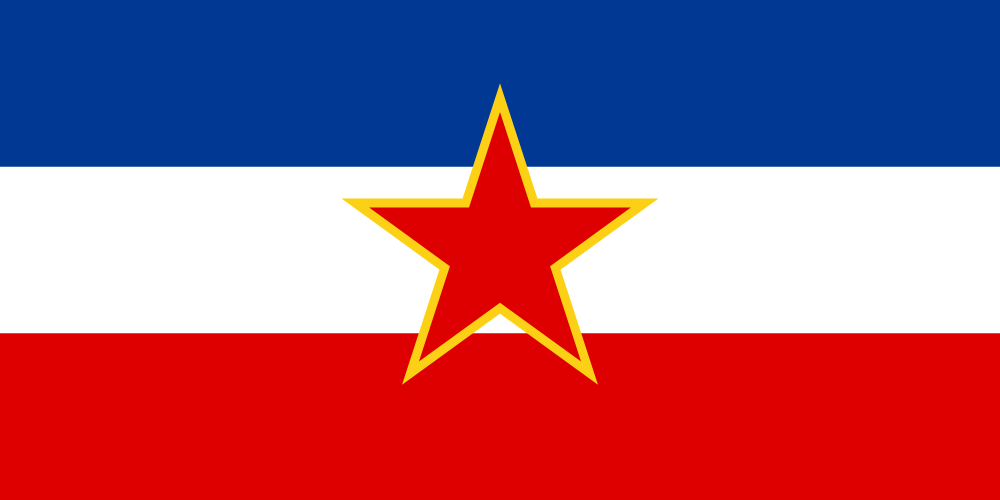
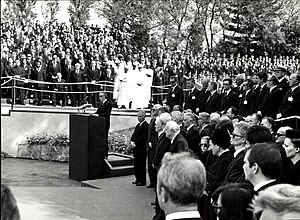
Josip Broz Tito, the longtime leader of Yugoslavia, passed away on May 4th, 1980. He died in the Department of Cardiovascular Surgery at the University Medical Center, Ljubljana, of complications from gangrene. He was 88 years old. Though Tito’s passing had been expected for some time, it still struck his nation like a thunder wave when it finally occurred.
Tito left behind a legacy that shaped the complex political landscape of the Balkans. Tito had been at the helm of Yugoslavia since the end of World War II, leading the country through a unique experiment in socialist self-management and non-alignment during the Cold War. His death marked the end of an era, and the funeral that followed was a monumental event that reflected both the respect for Tito and the challenges Yugoslavia would face in the post-Tito era.
Organized by Lazar Koliševski, Tito’s protege and hand-picked successor, Tito's funeral was held four days after his passing on May 8th. It was attended by a diverse array of world leaders, reflecting Tito's role as a key figure in the Non-Aligned Movement. Leaders from both the Eastern and Western blocs, including Soviet Premier Nikolai Tikhonov (First Secretary Suslov chose not to attend), U.S. Vice President Lloyd Bentsen, and British Prime Minister Denis Healey, gathered in Belgrade to pay their respects. The presence of leaders from different ideological backgrounds underscored Tito's ability to navigate the treacherous waters of Cold War politics, maintaining Yugoslavia's independence and non-alignment.
The funeral procession itself was a solemn and elaborate affair. Tito's body lay in state at the Museum of the Revolution in Belgrade, allowing thousands of Yugoslavs to pay their respects. The procession through the streets of Belgrade was a somber spectacle, with a military escort accompanying the casket. The emotional outpouring from the Yugoslav people was genuine, reflecting the complex feelings many had for their departed leader.
Tito's death also exposed the underlying ethnic and nationalist tensions within Yugoslavia. Tito had managed to keep these tensions in check through his authoritarian rule and a carefully crafted system of ethnic balance. However, with his passing, there was a growing sense of uncertainty about the future of the multi-ethnic state he had held together. The funeral became a stage where these tensions were both visible and palpable.
Shortly after news of Tito’s death spread across the country, the leadership of Croatia considered choosing not to attend the president’s funeral as a form of protest. For decades, these Croats felt that Tito had unnecessarily centralized power in Belgrade, at the expense of the various regions and nations within Yugoslavia. Thankfully for Yugoslav national unity, acting president Koliševski, a Macedonian, reached out to leaders of the Croatian opposition, and invited them to off the record talks to be held after the funeral’s conclusion, so that their concerns could be heard.
Tito had warned Koliševski that in the aftermath of Tito’s death, long-dormant nationalist feelings would likely rise up once more. This could threaten the stability of Yugoslavia, which had long been held together by Tito’s harsh, repressive tactics and authoritarian rule. Thus, Koliševski knew he must act quickly. After hearing out the Croatian concerns and hosting the magnificent state funeral for his predecessor, Koliševski worked to forge alliances within the presidency of Yugoslavia.
According to the Yugoslav Constitution of 1974, under which the country now operated, the “presidency” was made up of nine members, one for each member republic/autonomous region of Yugoslavia, and one for the president of the Yugoslav Communist Party. During Tito’s rule, Tito, as president of the Communist Party (and “president for life”), acting as a de facto dictator, effectively ran the presidency as his own personal council of advisors. With Tito out of the picture however, Koliševski, who as Tito’s vice president had temporarily ascended to his role of acting president, faced a critical decision. He could either attempt to rule by fiat as Tito had, or he could allow the presidential council to operate in accordance with the Constitution for the first time.
In the end, Koliševski decided upon the latter.
In contrast to the recent “hardline” attitude coming out of Moscow in the form of the New Troika, Koliševski elected to pursue a more “liberal” form of communism. While he maintained the same strict press censorship and the secret police apparatus that Tito had, he simultaneously advocated for improvements to the living standards of the everyday people of Yugoslavia. Koliševski affirmed his continued support for national unity, while allowing for autonomy amongst the republics where possible. He also preached continued presence in the non-aligned movement, and described the other communist nations of the world as “straying from a vision of achievable socialism”.
Though it would take time for Koliševski, by then 66 years old, to firmly establish himself as Tito’s successor, his service as a partisan in World War II, and the fine work he had done to promote Macedonian national identity and development, even as he also supported continued Yugoslav unity, made him a strong candidate to lead the nation forward. Ten days after becoming active president, Koliševski was elected for an official term of his own by the presidency council.
…
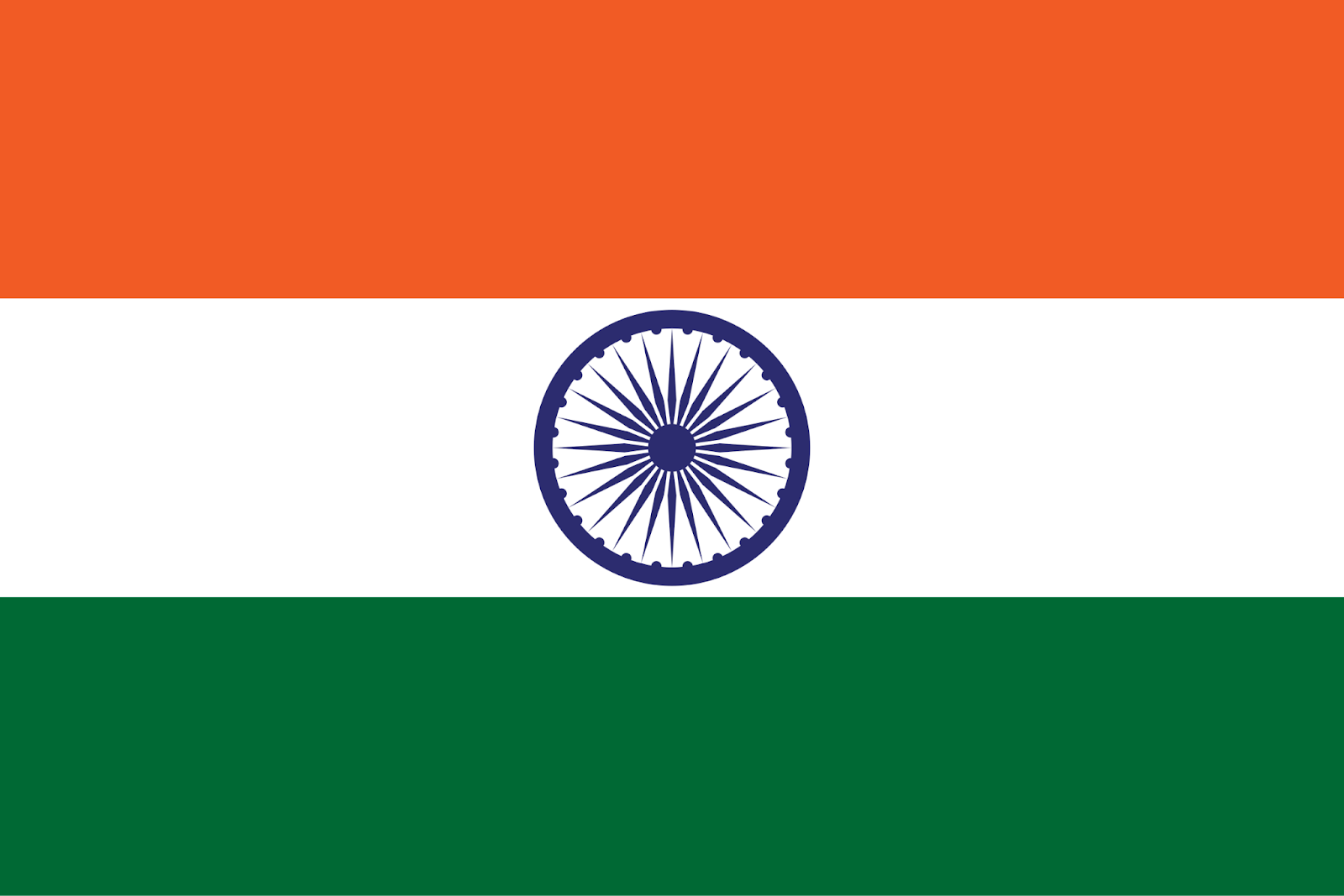
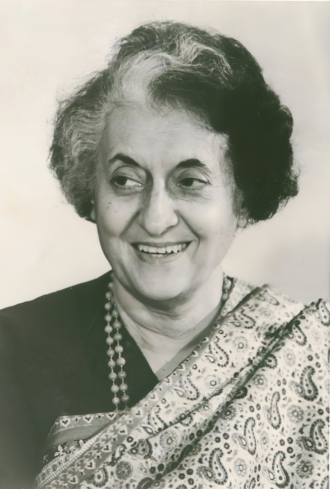
The 1970s were a period of immense change for the Republic of India. By far the largest and most consequential of these changes was Indira Gandhi’s strategic realignment in the Cold War, shifting her nation away from the Non-Aligned Movement and toward the United States and her western allies.
During Gandhi’s initial years in power as Prime Minister (1966 - 1977), her strong personal rapport with first President John F. Kennedy and then George Romney and George Bush, combined with the distressing development of the joint Pakistani-Soviet invasion of Afghanistan in 1974, led Gandhi to calculate that closer ties to the West were her nation’s best hope for stability in Southeast Asia. This decision led to a cascade of changes, both foreign and domestic. For one thing, despite its shift in alliances, Gandhi felt that the only way to truly protect Indian sovereignty was to acquire weapons of mass-destruction to act as a deterrent, especially against the People’s Republic of China. Thus, in 1974, in a top-secret project codenamed “Smiling Buddha”, India successfully tested its first nuclear weapon. Though the Soviets, on behalf of their new ally, Pakistan, condemned the tests, the United States and her allies (under President Bush) remained silent. In Bush’s mind, he could use a nuclear India as a bargaining chip in his negotiations with Chairman Zhou to open China to Western trade and influence. Throughout the 1970s, the Indian military reformed its organization and equipment to be more in line with Western models. American jet fighter designs (albeit not the most cutting edge models) were purchased for production and deployment in India, as were designs for warships, tanks, small arms, and other equipment. Though India fully intended to develop its own arms manufacturing sector in the future, for the time being, it did not want to be reliant on the Soviet Union for any of its defenses.
Domestically, Gandhi’s realignment had massive consequences as well. Historically, her party, the Indian National Congress, had favored largely nationalistic and socialist policies. Even before her historic decision to switch sides in the Cold War, Indira Gandhi was dismissed by some socialists in her party as “Goongi gudiya” (Hindi for “dumb doll”). They claimed that she had achieved the success that she had in national politics only because of who her father was - Jawaharlal Nehru - arguably the father of modern India. In shifting India’s allegiance to the Americans and their allies, Gandhi argued, she was actually cleaving to her father’s goals for their country - national sovereignty, secularism, and social democracy. She pursued further industrialization, urbanization, and economic liberalization, a departure from what some socialists in the party wanted.
This divide - between Gandhi and the socialists in the INC - led to the Congress’ defeat in the 1977 elections by the Janata Alliance. A broad coalition of parties generally opposed to Gandhi personally, the Alliance campaigned on the slogan - “Democracy or Dictatorship?”. Their primary claim - that Gandhi had ruled India for too long, and was grooming her son, Sanjay, to someday succeed her, was widely acknowledged throughout the Indian population. Gandhi’s successor, 81 year old Morarji Desai, promised a return to peaceful relations with both China and Pakistan. He did not last long in the position, however.
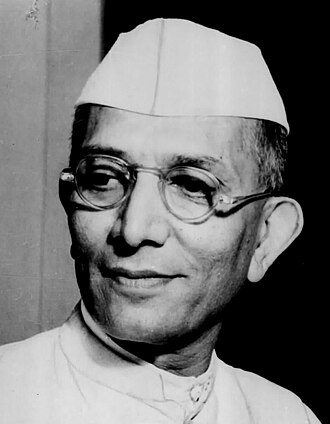

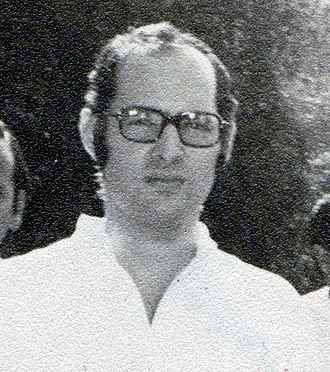
Above: Morarji Desai and Sanjay Gandhi, 4th and 5th Prime Ministers of India, respectively. Between them, the 1980 VW Kharagosh.
Defiant in defeat, Gandhi rejected an offer from the King of Nepal to relocate (along with her sons) to that country. Instead, having retained her own seat in Parliament, she campaigned hard for her younger son, Sanjay, only 34 at the time, to be elected leader of the Indian National Congress in 1980. As part of this strategy, Sanjay made an effort to distinguish himself. Eventually, the younger Gandhi contacted Volkswagen AG from West Germany for a possible collaboration, transfer of technology and joint production of the Indian version of the "People's Car", to emulate Volkswagen's worldwide success with the Beetle. Volkswagen, under encouragement from Chancellor Helmut Schmidt, agreed. The car, eventually dubbed the “Kharagosh 2D” (after the Hindi word for “rabbit”, as it was based on the 1979 VW Rabbit), became iconic throughout India and later, thanks to its prominent role in Bollywood films, throughout the world. The collaboration between VW and the Indian government, as well as the tremendous revenue offered by the Indian market to West German and other European and American manufacturers, only served to cement the Western-facing alignment pioneered by Gandhi’s mother.
In the end, the INC refused to nominate the younger Gandhi for party leadership. He was too young and untested, they claimed, whether he had helped develop the “People’s car” or not. The Congress did, however, eventually reelect his mother as party leader to head into the 1980 legislative elections. By that time, deep fissures had formed in the ruling coalition. Prime Minister Desai was stepping down and it was time, it seemed, for the nation to “come home” to Gandhi. Positioning the Congress as a center-left, social democratic party, rather than an out and out “socialist” one, Gandhi managed to attract liberals and centrists disaffected by the more conservative or “far-left” elements of the coalition. The Congress was swept back into power in the January 1980 elections and Gandhi was Prime Minister once again.
By the 1980s, India experienced significant economic growth, fueled by Western investments and technological collaborations, like the aforementioned deals with American defense contractors and VW. Continued alignment with the United States opened avenues for technological advancements, and India became a hub for innovation and industrial development. Gandhi’s socially democratic economic reforms, initiated in the 1970s bore fruit, transforming India into a major player in the global economy by the end of the latter decade.
Finally, the domestic political landscape in India remained dynamic.
Indira Gandhi, having weathered domestic and international challenges, continued to lead the country until finally stepping down, in favor of Sanjay, her chosen heir, in 1984. The political narrative espoused by Sanjay’s INC emphasized the importance of the Indo-U.S. alliance in safeguarding India's interests in a rapidly changing world. The opposition, while critical of certain policies, and especially of continued Gandhi-family nepotism, was forced to acknowledge the benefits of the strategic alignment in ensuring regional stability.
The 1980s also witnessed something of a cultural renaissance in India, influenced by increased global interactions. The country became a melting pot of diverse influences, and a surge in international collaborations led to a rich tapestry of art, music, and literature. The youth, exposed to global trends, contributed to a dynamic cultural landscape, which would see the rise of not just “Bollywood” films and television series, but also “Indipop” - a portmanteau of “Indian pop” music across the globe.
Above: Salaam Bombay!, a critically-acclaimed Bollywood film, which won the 1988 Academy Award for best foreign language film (left). Sheila Chandra, a British singer of Indian descent, who proved instrumental in the spread of “Indipop” around the world throughout the 1980s.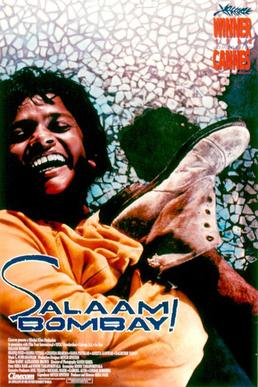

…
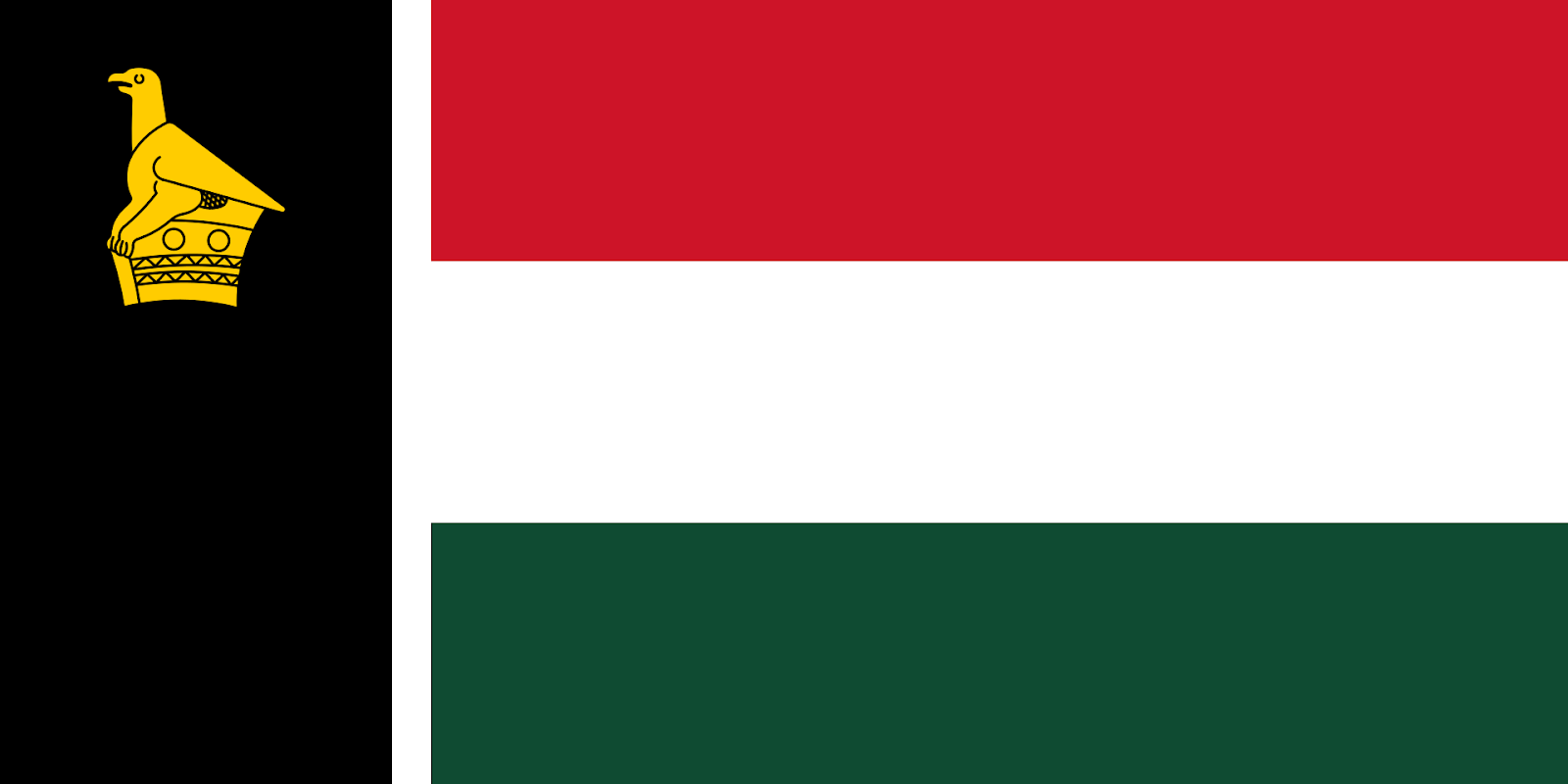
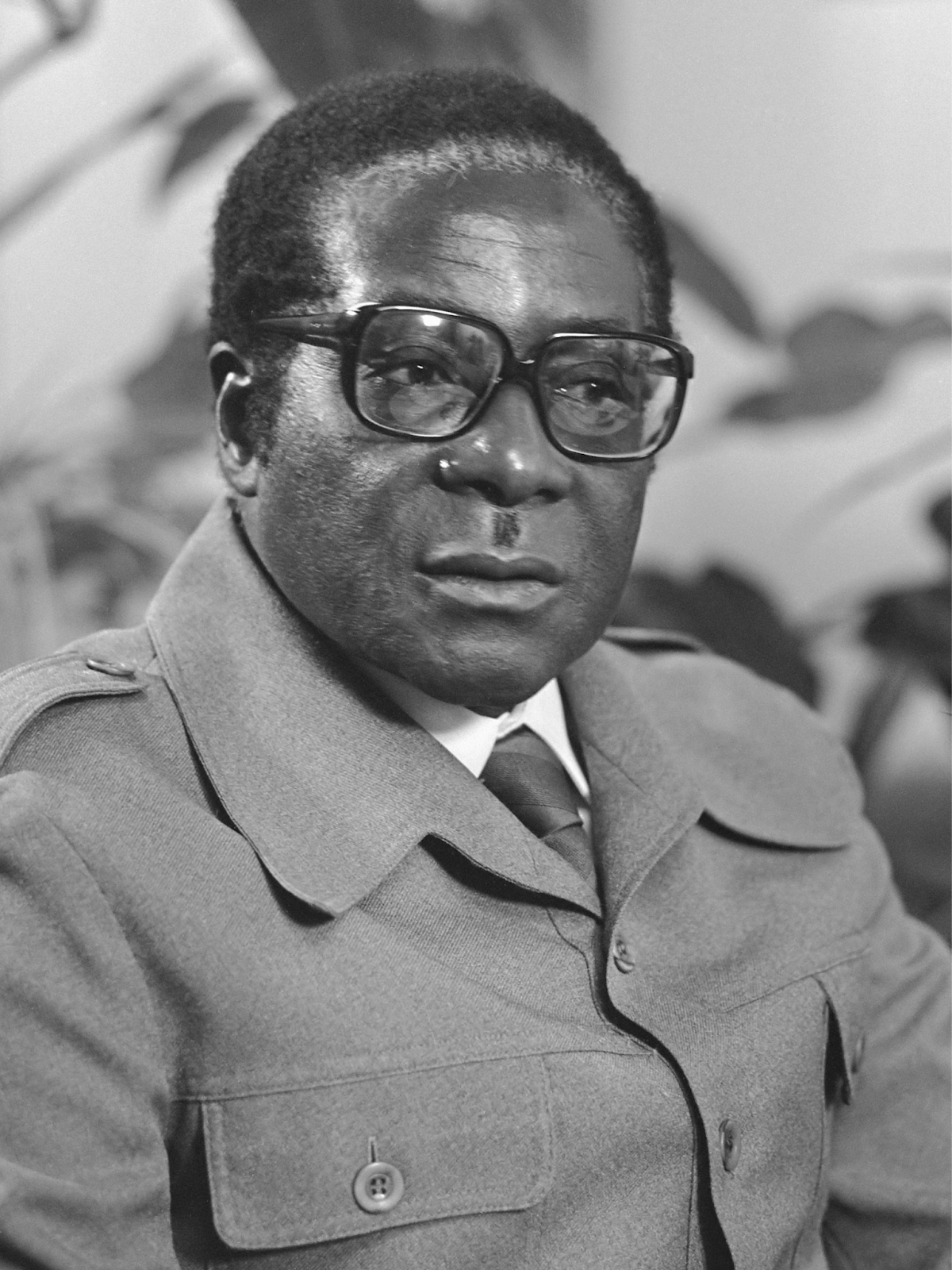
Robert Gabriel Mugabe was born on February 21st, 1924, in British-ruled Southern Rhodesia (now Zimbabwe-Rhodesia). Educated in mission schools and later at Fort Hare University in South Africa, Mugabe initially trained as a teacher. However, his passion for politics led him to become involved in anti-colonial activism. In the early 1960s, he joined the National Democratic Party, which later transformed into the Zimbabwe African National Union (ZANU), one of the leading liberation movements.
As tensions escalated between the white-minority government of Rhodesia and black nationalists, Mugabe emerged as a key figure advocating for armed resistance. In 1964, he was arrested for his involvement in subversive activities and spent the next several years in prison. During his imprisonment, Rhodesia declared unilateral independence from Britain in 1965 under Prime Minister Ian Smith, further intensifying the struggle for majority rule, and leading to the Rhodesian War with the United Kingdom.
During the chaos of the Rhodesian conflict, Mugabe managed to escape from prison. Seizing the opportunity presented by the intervention, Mugabe aligned himself with other nationalist forces and began organizing a guerrilla war against the new Rhodesian government. His charisma and leadership skills quickly made him an important figure in the resistance movement, and, at the time, he was seen as an ally by the British, including Prime Minister Randolph Churchill.
The war led to significant diplomatic efforts between the various nations involved, culminating in negotiations to end the bloodshed. The United Kingdom envisioned the creation of a Commonwealth state - “Zimbabwe-Rhodesia”, which would ensure that majority rule is enshrined in the country's constitution. Peace negotiations, held in London in the mid 1970s, lay the groundwork for a transitional government and the promise of democratic elections.
Zimbabwe-Rhodesia, now a Commonwealth state with de jure and de facto majority rule, faced the challenges of post-independence nation-building. The scars of the war lingered, and efforts were made to reconcile the deeply divided society.
Mugabe transitioned from his role as a guerilla fighter toward leading a nationalist political party, the Zimbabwe African National Union (ZANU) into the 1980 general election in March. Mugabe hoped to turn enough of the country’s black population against then Prime Minister, Abel Muzorewa, to get himself into power. He failed to do so, however.
Mugabe’s personal ideology, a bizarre blend of anti-imperialism, Marxism-Leninism, populism, and strongman tendencies made him an unappealing candidate to white and black Zimbabwe-Rhodesians alike. In the end, Muzorewa was reelected to another term, and ZANU failed to pick up more than a few seats in the House of Assembly. Incensed, Mugabe refused to take his seat in protest, and vowed “revenge” on the “puppet regime” of Muzorewa. Thus, Mugabe went back into the wilderness of Zimbabwe-Rhodesia. The stochastic terrorism that had defined the new nation’s founding would continue, at least until the government managed to find and arrest Mugabe and his militias.
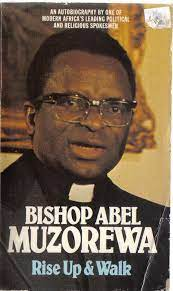
Above: Rise Up & Walk - an autobiography by Prime Minister Abel Muzorewa, written for the 1980 campaign against Robert Mugabe.
Next Time on Blue Skies in Camelot: War in the Middle East!
Without Marcos, Sr. becoming our president to lead the country for two freaking decades by becoming a dictator to declare martial law and abolished the 1935 Constitution, controlling every walk of our lives to the point that his opposition were in exile or killed from his army, doing crimes against humanity, using the money he and his family borrowed from all the world banks from their self-interest, and he controlled and censored the media to be in his favor and not talked against him IOTL, our country were in better place ITTL thanks to the flourishing arts and culture, exercising but protecting press freedom, improving government leadership under the 1935 Constitution, and people in our country were now politically and socially aware to the point that they were becoming responsible citizens of the world.Indeed me too, I don’t think anybody except for our neighbourhood friendly Filipinos here would know anything about the television of their country of this specific time period in the 1960s and 1970s ITTL, let alone by how much it would be change and diverge from IOTL.
Indeed, good stuff!Without Marcos, Sr. becoming our president to lead the country for two freaking decades by becoming a dictator to declare martial law and abolished the 1935 Constitution, controlling every walk of our lives to the point that his opposition were in exile or killed from his army, doing crimes against humanity, using the money he and his family borrowed from all the world banks from their self-interest, and he controlled and censored the media to be in his favor and not talked against him IOTL, our country were in better place ITTL thanks to the flourishing arts and culture, exercising but protecting press freedom, improving government leadership under the 1935 Constitution, and people in our country were now politically and socially aware to the point that they were becoming responsible citizens of the world.
Indeed that too!great chapter. Nice summary of major world events. Glad to see Amin pay for his crimes and not just be exiled. Glad Yugoslavia is becoming more Liberal. Nice to see Gandhi not be assassinated and her efforts have a positive effect on India. And I cannot tell you how happy I am that Mugabe lost the 1980 election. That man and Amin were the wrist of the worst
I thought Mugabe was arrested and taken into custody in 1975 by the British.Chapter 138 - Enola Gay - More Events from Around the World in 1980Above: Idi Amin, 3rd President of Uganda from 1971 - 1979, widely considered one of the most brutal despots in history (left); one of twenty-one nuclear weapons tests performed by the Soviet Union in 1980 (center); Lazar Koliševski, 2nd President of the Socialist Federal Republic of Yugoslavia (right).



“Enola Gay
You should have stayed at home yesterday
Ah-ha, words can't describe
The feeling and the way you lied
These games you play
They're going to end in more than tears some day
Ah-ha Enola Gay
It shouldn't ever have to end this way” - “Enola Gay”, Orchestral Manoeuvres in the Dark
“None of our republics would be anything if we weren't all together; but we have to create our own history - history of United Yugoslavia, also in the future.” - Josip Broz Tito
“I am the hero of Africa.” - Idi Amin
Idi Amin Dada Oumee was a Ugandan military officer and politician who served as the third president of Uganda from 1971 to 1979. Throughout his presidency, he ruled as a military dictator and is considered one of the most brutal despots in modern history.
Unpacking the infamy of Amin is difficult, given the many tall-tales told about his time in power. This chronicle will delegate this to other sources. Instead, it will focus on a brief recounting of the man’s ascent to power and his downfall.
Amin was born in Koboko in what is now northwest Uganda to a Kakwa father and Lugbara mother. In 1946, he joined the King's African Rifles (KAR) of the British Colonial Army as a cook. He rose to the rank of lieutenant, taking part in British actions against Somali rebels and then the Mau Mau Uprising in Kenya. Uganda gained independence from the United Kingdom in 1962, and Amin remained in the army, rising to the position of major and being appointed commander of the Uganda Army in 1965. He became aware that Ugandan President Milton Obote was planning to arrest him for misappropriating army funds, so he launched a coup d'état in 1971 and declared himself president of the country.
Affectionately nicknamed “Big Daddy” by his supporters, Amin was also known by many, many names by his enemies. These included: “kijambiya” (“Machete”); “Butcher of Uganda”; “Butcher of Africa”; “Butcher of Kampala”; and “the Black Hitler”.
During his years in power, Amin shifted from being a ruler aligned with the West, enjoying considerable support from Israel, to being backed by Libya's Muammar Gaddafi, Zaire's Mobutu Sese Seko, the Soviet Union, and East Germany. In 1972, Amin expelled Asians, a majority of whom were Indian-Ugandans, leading India (then under Prime Minister Indira Gandhi) to sever diplomatic relations with his regime. In 1975, Amin became the chairman of the Organization of African Unity (OAU), a Pan-Africanist group designed to promote solidarity among African states. Uganda was a member of the United Nations Commission on Human Rights from 1977 to 1979, a position which attracted widespread condemnation in the United States and elsewhere given Amin’s horrific record in that arena.
The United Kingdom broke diplomatic relations with Uganda in 1977, and Amin declared that he had defeated the British and added "CBE" to his title for "Conqueror of the British Empire". His full self-bestowed title ultimately became: "His Excellency, President for Life, Field Marshal Al Hadji Doctor Idi Amin Dada, VC, DSO, MC, CBE, Lord of All the Beasts of the Earth and Fishes of the Seas and Conqueror of the British Empire in Africa in General and Uganda in Particular", in addition to his officially stated claim of being the uncrowned king of Scotland.
Amin became the subject of many, many rumors, including a widespread belief that he was a cannibal. Amin reportedly also boasted that he kept the decapitated heads of political enemies in his freezer, although he said that human flesh was generally "too salty" for his taste. The truth of these rumors, or the extent to which they are true, is still debated by historians today.
During Amin's time in power, popular media outside of Uganda often portrayed him as an essentially comic and eccentric figure.
Julius Harris emphasized Amin's allegedly clownish side in Victory at Entebbe, while Yaphet Kotto (who would go on to find far greater fame playing Lando Calrissian in The Empire Strikes Back) drew more praise for projecting Amin's sinister nature in Raid on Entebbe. In a 1977 assessment typical of the time, a Time magazine article described him as a "killer and clown, a big-hearted buffoon and strutting martinet". The comedy-variety series Saturday Night Live aired four Amin sketches between 1976 and 1979, including one in which he was an ill-behaved houseguest in exile, and another in which he was a spokesman against venereal disease.
Though generally mocking, these depictions, according to Ugandan exiles and survivors of Amin’s reigns of terror, did little to represent the dictator’s brutal, bloodthirsty nature. They argued that these depictions in Western media often downplayed the severity of Amin’s crimes against humanity. Thankfully, those would, in the end, be prosecuted.
As Amin's rule progressed into the late 1970s, there was increased unrest against his persecution of certain ethnic groups and political dissidents, along with Uganda's very poor international standing due to Amin's support for the terrorist hijackers in the so-called “Operation Entebbe”. He then attempted to annex Tanzania's Kagera Region in 1978. The Tanzanian president - Julius Nyerere - ordered his troops to invade Uganda in response. Tanzanian Army and rebel forces successfully captured Kampala in 1979 and ousted Amin from power.
Amin attempted to flee into exile in Libya, where he hoped to live as a guest of his old ally Gaddafi. His plans were intercepted by agents of British Intelligence, however, who passed them along to the International Criminal Court in the Hague. There, charges were drawn up against Amin for crimes against humanity. Among these were political repression, ethnic persecution, extrajudicial killings, as well as nepotism, corruption, and gross economic mismanagement. International observers and human rights groups estimate that between 100,000 and 500,000 people were killed under his regime, making him a prime candidate for trial in the Hague. Warrants were drawn up for Amin’s arrest and handed off to INTERPOL.
An issue presented itself, however. Would Muammar Gaddafi - the so-called “Mad Dog of the Middle East” - turn on his fellow dictator and allow him to be extradited to Europe? Gaddafi’s relationships with the United States, United Kingdom, and Israel in particular were terrible. If any of these countries reached out to lead the negotiations with Gaddafi, they seemed bound to fail.
To try and get around this, British Prime Minister Denis Healey and Dutch PM Dries van Agt reached out to French President Francois Mitterand, and implored France to approach Gaddafi. Given that Gaddafi’s government purchased most of its arms from France and the Soviet Union, and that Gaddafi was likely to see Mitterand as a “fellow Socialist”, the negotiations to extradite Amin might be more likely to succeed. Mitterand agreed. After several weeks of tense, top secret negotiations, Gaddafi and Mitterand’s representatives came to an agreement: in exchange for a financial aid package and a shipment of modern military equipment (including LRAC F1s - reusable rocket launchers and artillery shells), Gaddafi agreed to betray his old friend and fellow dictator.
So it was that in June of 1979, Amin was apprehended by Libyan police and agents of INTERPOL at Gaddafi’s residence in Benghazi. He was said to be “shocked” by the officers who arrested them. Amin had thought himself “invincible” for so long, that he did not know how to process being placed under arrest. He was extradited to the Netherlands where he would be held until his trial in the Hague could be completed. It was shortly thereafter.
Found guilty of his crimes against humanity, Idi Amin was sentenced to life imprisonment in 1982. He would serve his sentence until passing away from kidney failure on August 16th, 2003 at the age of either 77 or 78 (his date of birth is difficult for historians to pin down).
…


Josip Broz Tito, the longtime leader of Yugoslavia, passed away on May 4th, 1980. He died in the Department of Cardiovascular Surgery at the University Medical Center, Ljubljana, of complications from gangrene. He was 88 years old. Though Tito’s passing had been expected for some time, it still struck his nation like a thunder wave when it finally occurred.
Tito left behind a legacy that shaped the complex political landscape of the Balkans. Tito had been at the helm of Yugoslavia since the end of World War II, leading the country through a unique experiment in socialist self-management and non-alignment during the Cold War. His death marked the end of an era, and the funeral that followed was a monumental event that reflected both the respect for Tito and the challenges Yugoslavia would face in the post-Tito era.
Organized by Lazar Koliševski, Tito’s protege and hand-picked successor, Tito's funeral was held four days after his passing on May 8th. It was attended by a diverse array of world leaders, reflecting Tito's role as a key figure in the Non-Aligned Movement. Leaders from both the Eastern and Western blocs, including Soviet Premier Nikolai Tikhonov (First Secretary Suslov chose not to attend), U.S. Vice President Lloyd Bentsen, and British Prime Minister Denis Healey, gathered in Belgrade to pay their respects. The presence of leaders from different ideological backgrounds underscored Tito's ability to navigate the treacherous waters of Cold War politics, maintaining Yugoslavia's independence and non-alignment.
The funeral procession itself was a solemn and elaborate affair. Tito's body lay in state at the Museum of the Revolution in Belgrade, allowing thousands of Yugoslavs to pay their respects. The procession through the streets of Belgrade was a somber spectacle, with a military escort accompanying the casket. The emotional outpouring from the Yugoslav people was genuine, reflecting the complex feelings many had for their departed leader.
Tito's death also exposed the underlying ethnic and nationalist tensions within Yugoslavia. Tito had managed to keep these tensions in check through his authoritarian rule and a carefully crafted system of ethnic balance. However, with his passing, there was a growing sense of uncertainty about the future of the multi-ethnic state he had held together. The funeral became a stage where these tensions were both visible and palpable.
Shortly after news of Tito’s death spread across the country, the leadership of Croatia considered choosing not to attend the president’s funeral as a form of protest. For decades, these Croats felt that Tito had unnecessarily centralized power in Belgrade, at the expense of the various regions and nations within Yugoslavia. Thankfully for Yugoslav national unity, acting president Koliševski, a Macedonian, reached out to leaders of the Croatian opposition, and invited them to off the record talks to be held after the funeral’s conclusion, so that their concerns could be heard.
Tito had warned Koliševski that in the aftermath of Tito’s death, long-dormant nationalist feelings would likely rise up once more. This could threaten the stability of Yugoslavia, which had long been held together by Tito’s harsh, repressive tactics and authoritarian rule. Thus, Koliševski knew he must act quickly. After hearing out the Croatian concerns and hosting the magnificent state funeral for his predecessor, Koliševski worked to forge alliances within the presidency of Yugoslavia.
According to the Yugoslav Constitution of 1974, under which the country now operated, the “presidency” was made up of nine members, one for each member republic/autonomous region of Yugoslavia, and one for the president of the Yugoslav Communist Party. During Tito’s rule, Tito, as president of the Communist Party (and “president for life”), acting as a de facto dictator, effectively ran the presidency as his own personal council of advisors. With Tito out of the picture however, Koliševski, who as Tito’s vice president had temporarily ascended to his role of acting president, faced a critical decision. He could either attempt to rule by fiat as Tito had, or he could allow the presidential council to operate in accordance with the Constitution for the first time.
In the end, Koliševski decided upon the latter.
In contrast to the recent “hardline” attitude coming out of Moscow in the form of the New Troika, Koliševski elected to pursue a more “liberal” form of communism. While he maintained the same strict press censorship and the secret police apparatus that Tito had, he simultaneously advocated for improvements to the living standards of the everyday people of Yugoslavia. Koliševski affirmed his continued support for national unity, while allowing for autonomy amongst the republics where possible. He also preached continued presence in the non-aligned movement, and described the other communist nations of the world as “straying from a vision of achievable socialism”.
Though it would take time for Koliševski, by then 66 years old, to firmly establish himself as Tito’s successor, his service as a partisan in World War II, and the fine work he had done to promote Macedonian national identity and development, even as he also supported continued Yugoslav unity, made him a strong candidate to lead the nation forward. Ten days after becoming active president, Koliševski was elected for an official term of his own by the presidency council.
…


The 1970s were a period of immense change for the Republic of India. By far the largest and most consequential of these changes was Indira Gandhi’s strategic realignment in the Cold War, shifting her nation away from the Non-Aligned Movement and toward the United States and her western allies.
During Gandhi’s initial years in power as Prime Minister (1966 - 1977), her strong personal rapport with first President John F. Kennedy and then George Romney and George Bush, combined with the distressing development of the joint Pakistani-Soviet invasion of Afghanistan in 1974, led Gandhi to calculate that closer ties to the West were her nation’s best hope for stability in Southeast Asia. This decision led to a cascade of changes, both foreign and domestic. For one thing, despite its shift in alliances, Gandhi felt that the only way to truly protect Indian sovereignty was to acquire weapons of mass-destruction to act as a deterrent, especially against the People’s Republic of China. Thus, in 1974, in a top-secret project codenamed “Smiling Buddha”, India successfully tested its first nuclear weapon. Though the Soviets, on behalf of their new ally, Pakistan, condemned the tests, the United States and her allies (under President Bush) remained silent. In Bush’s mind, he could use a nuclear India as a bargaining chip in his negotiations with Chairman Zhou to open China to Western trade and influence. Throughout the 1970s, the Indian military reformed its organization and equipment to be more in line with Western models. American jet fighter designs (albeit not the most cutting edge models) were purchased for production and deployment in India, as were designs for warships, tanks, small arms, and other equipment. Though India fully intended to develop its own arms manufacturing sector in the future, for the time being, it did not want to be reliant on the Soviet Union for any of its defenses.
Domestically, Gandhi’s realignment had massive consequences as well. Historically, her party, the Indian National Congress, had favored largely nationalistic and socialist policies. Even before her historic decision to switch sides in the Cold War, Indira Gandhi was dismissed by some socialists in her party as “Goongi gudiya” (Hindi for “dumb doll”). They claimed that she had achieved the success that she had in national politics only because of who her father was - Jawaharlal Nehru - arguably the father of modern India. In shifting India’s allegiance to the Americans and their allies, Gandhi argued, she was actually cleaving to her father’s goals for their country - national sovereignty, secularism, and social democracy. She pursued further industrialization, urbanization, and economic liberalization, a departure from what some socialists in the party wanted.
This divide - between Gandhi and the socialists in the INC - led to the Congress’ defeat in the 1977 elections by the Janata Alliance. A broad coalition of parties generally opposed to Gandhi personally, the Alliance campaigned on the slogan - “Democracy or Dictatorship?”. Their primary claim - that Gandhi had ruled India for too long, and was grooming her son, Sanjay, to someday succeed her, was widely acknowledged throughout the Indian population. Gandhi’s successor, 81 year old Morarji Desai, promised a return to peaceful relations with both China and Pakistan. He did not last long in the position, however.



Above: Morarji Desai and Sanjay Gandhi, 4th and 5th Prime Ministers of India, respectively. Between them, the 1980 VW Kharagosh.
Defiant in defeat, Gandhi rejected an offer from the King of Nepal to relocate (along with her sons) to that country. Instead, having retained her own seat in Parliament, she campaigned hard for her younger son, Sanjay, only 34 at the time, to be elected leader of the Indian National Congress in 1980. As part of this strategy, Sanjay made an effort to distinguish himself. Eventually, the younger Gandhi contacted Volkswagen AG from West Germany for a possible collaboration, transfer of technology and joint production of the Indian version of the "People's Car", to emulate Volkswagen's worldwide success with the Beetle. Volkswagen, under encouragement from Chancellor Helmut Schmidt, agreed. The car, eventually dubbed the “Kharagosh 2D” (after the Hindi word for “rabbit”, as it was based on the 1979 VW Rabbit), became iconic throughout India and later, thanks to its prominent role in Bollywood films, throughout the world. The collaboration between VW and the Indian government, as well as the tremendous revenue offered by the Indian market to West German and other European and American manufacturers, only served to cement the Western-facing alignment pioneered by Gandhi’s mother.
In the end, the INC refused to nominate the younger Gandhi for party leadership. He was too young and untested, they claimed, whether he had helped develop the “People’s car” or not. The Congress did, however, eventually reelect his mother as party leader to head into the 1980 legislative elections. By that time, deep fissures had formed in the ruling coalition. Prime Minister Desai was stepping down and it was time, it seemed, for the nation to “come home” to Gandhi. Positioning the Congress as a center-left, social democratic party, rather than an out and out “socialist” one, Gandhi managed to attract liberals and centrists disaffected by the more conservative or “far-left” elements of the coalition. The Congress was swept back into power in the January 1980 elections and Gandhi was Prime Minister once again.
By the 1980s, India experienced significant economic growth, fueled by Western investments and technological collaborations, like the aforementioned deals with American defense contractors and VW. Continued alignment with the United States opened avenues for technological advancements, and India became a hub for innovation and industrial development. Gandhi’s socially democratic economic reforms, initiated in the 1970s bore fruit, transforming India into a major player in the global economy by the end of the latter decade.
Finally, the domestic political landscape in India remained dynamic.
Indira Gandhi, having weathered domestic and international challenges, continued to lead the country until finally stepping down, in favor of Sanjay, her chosen heir, in 1984. The political narrative espoused by Sanjay’s INC emphasized the importance of the Indo-U.S. alliance in safeguarding India's interests in a rapidly changing world. The opposition, while critical of certain policies, and especially of continued Gandhi-family nepotism, was forced to acknowledge the benefits of the strategic alignment in ensuring regional stability.
The 1980s also witnessed something of a cultural renaissance in India, influenced by increased global interactions. The country became a melting pot of diverse influences, and a surge in international collaborations led to a rich tapestry of art, music, and literature. The youth, exposed to global trends, contributed to a dynamic cultural landscape, which would see the rise of not just “Bollywood” films and television series, but also “Indipop” - a portmanteau of “Indian pop” music across the globe.
Above: Salaam Bombay!, a critically-acclaimed Bollywood film, which won the 1988 Academy Award for best foreign language film (left). Sheila Chandra, a British singer of Indian descent, who proved instrumental in the spread of “Indipop” around the world throughout the 1980s.

…


Robert Gabriel Mugabe was born on February 21st, 1924, in British-ruled Southern Rhodesia (now Zimbabwe-Rhodesia). Educated in mission schools and later at Fort Hare University in South Africa, Mugabe initially trained as a teacher. However, his passion for politics led him to become involved in anti-colonial activism. In the early 1960s, he joined the National Democratic Party, which later transformed into the Zimbabwe African National Union (ZANU), one of the leading liberation movements.
As tensions escalated between the white-minority government of Rhodesia and black nationalists, Mugabe emerged as a key figure advocating for armed resistance. In 1964, he was arrested for his involvement in subversive activities and spent the next several years in prison. During his imprisonment, Rhodesia declared unilateral independence from Britain in 1965 under Prime Minister Ian Smith, further intensifying the struggle for majority rule, and leading to the Rhodesian War with the United Kingdom.
During the chaos of the Rhodesian conflict, Mugabe managed to escape from prison. Seizing the opportunity presented by the intervention, Mugabe aligned himself with other nationalist forces and began organizing a guerrilla war against the new Rhodesian government. His charisma and leadership skills quickly made him an important figure in the resistance movement, and, at the time, he was seen as an ally by the British, including Prime Minister Randolph Churchill.
The war led to significant diplomatic efforts between the various nations involved, culminating in negotiations to end the bloodshed. The United Kingdom envisioned the creation of a Commonwealth state - “Zimbabwe-Rhodesia”, which would ensure that majority rule is enshrined in the country's constitution. Peace negotiations, held in London in the mid 1970s, lay the groundwork for a transitional government and the promise of democratic elections.
Zimbabwe-Rhodesia, now a Commonwealth state with de jure and de facto majority rule, faced the challenges of post-independence nation-building. The scars of the war lingered, and efforts were made to reconcile the deeply divided society.
Mugabe transitioned from his role as a guerilla fighter toward leading a nationalist political party, the Zimbabwe African National Union (ZANU) into the 1980 general election in March. Mugabe hoped to turn enough of the country’s black population against then Prime Minister, Abel Muzorewa, to get himself into power. He failed to do so, however.
Mugabe’s personal ideology, a bizarre blend of anti-imperialism, Marxism-Leninism, populism, and strongman tendencies made him an unappealing candidate to white and black Zimbabwe-Rhodesians alike. In the end, Muzorewa was reelected to another term, and ZANU failed to pick up more than a few seats in the House of Assembly. Incensed, Mugabe refused to take his seat in protest, and vowed “revenge” on the “puppet regime” of Muzorewa. Thus, Mugabe went back into the wilderness of Zimbabwe-Rhodesia. The stochastic terrorism that had defined the new nation’s founding would continue, at least until the government managed to find and arrest Mugabe and his militias.

Above: Rise Up & Walk - an autobiography by Prime Minister Abel Muzorewa, written for the 1980 campaign against Robert Mugabe.
Next Time on Blue Skies in Camelot: War in the Middle East!
That may have already been established in an earlier chapter. 😛 I think I may have just made an error in my continuity again. Consider this more recent chapter the new canon.I thought Mugabe was arrested and taken into custody in 1975 by the British.
Its still not 1984.(no not the meme/book by eric blair. She was assasinated in 1984 and not in 1980).Nice to see Gandhi not be assassinated
1. im glad we seen what canada looked like ITTL, judging by the alternate canadian flag ITTL idk if i would even exist ITTL (maybe as someone who was AFAB ITTL as god originally planned who knows) also i hope we see what japan looks like soon ITTL, i wanna see how different nintendo and anime is ITTL, we already got the walkman, theres no stopping now!I also want to give a brief glimpse into the future...
Here is the current list of updates coming up next:
1. More events in 1980 from around the world.
2. War in the Middle East!
3. "Once in a Lifetime" - The 1980 Presidential Election
4. "You Make My Dreams" - The 1980 Downballots
5. Life in the Soviet Union, circa 1980
6. Comics in the 70s - A retrospective
2. a gulf war prologue (this is just like geronimo in regards to the gulf war II there having there right now in alternate 2006)
3. still praying that kennedy wins (judging by how many people writing TTL want kennedy to win, he just might!)
4. this is where i guess the alternate 80s truly begins ITTL (judging by the song being new age instead of folk) hopefully this retrospective will be as exciting as feel good inc pop culture 2005 over in geronimo
5. seeing how this is the ussr in 1980 i wonder how the soviet invasion of afghanistan will turn out (i pray it doesn't lead to 9/11 like in OTL)
6. this is gonna be exciting as well (wonder how furries are affected ITTL, considering how progressive TTL is furries may not be as hated or as underground ITTL
it has to be different (this is a timeline where the innocence and brains of the 1950s is untainted after all)How is Disney Animation or the Disney Company in general doing in this timeline? How has either changed from their state in 1980 IOTL?
So if Robert F. Kennedy is mentioned as a Supreme Court Associate Justice in 1985 when JFK dies (in chapter 113 of the original timeline), doesn’t that mean he’s either going to lose or be a one term President?
Impressive and surprising chapter you've done again Mr. President! Uganda's Idi Amin has finally been arrested for good for his crimes against humanity if it wasn't for Libya's Muammar Gaddafi to betray him in order to send financial aid and military weapons from France's Francois Mitterand due to the shared views in Socialism. Now I wonder what would happen to Gaddafi ITTL, would he also be arrested later in his life like IOTL or he's going to get better of himself ITTL? It is confirmed that Yaphet Kotto is Lando Calrissian in Star Wars Episode V: The Empire Strikes Back ITTL, alright I'm looking forward for this one!
The death of Yugoslavia's Josip Broz Tito and the rise of his successor Lazar Koliševski were about to bring the country and their Communist Ideology in liberal approach and having a dialog with all of the multi-ethnic communities in favor of their unity.
India was also going to a lot of changes ITTL thanks for Indira Gandhi being align herself with the Western Allies. Bollywood and Indipop were becoming an international recognition to the world. I just wished that Gandhi prevent her untimely death in 1984 to continue its successful alignment with the Western Allies.
Zimbabwe-Rhodesia was a surprising name of the country. I know it's just Zimbabwe in the Present IOTL, but I'm following you genius. It's a good news that Robert Mugabe didn't won the election and kept Bishop Abel Muzorewa in power until he handpicked his successor in the 80's or 90's ITTL. Hope the ICC ordered the arrest of Mugabe ITTL for good as well.
Well geniuses, we're off to a War in the Middle East. Terrorism is about to arrive here and we don't want Osama Bin Laden and his Al-Qaeda to happen 9/11 IOTL. His family weren't like that, and I know his parents have business. I still don't know why he turned to the dark side of history and he could've just work with his father's business? We'll see it the next chapter updates geniuses!
The death of Yugoslavia's Josip Broz Tito and the rise of his successor Lazar Koliševski were about to bring the country and their Communist Ideology in liberal approach and having a dialog with all of the multi-ethnic communities in favor of their unity.
India was also going to a lot of changes ITTL thanks for Indira Gandhi being align herself with the Western Allies. Bollywood and Indipop were becoming an international recognition to the world. I just wished that Gandhi prevent her untimely death in 1984 to continue its successful alignment with the Western Allies.
Zimbabwe-Rhodesia was a surprising name of the country. I know it's just Zimbabwe in the Present IOTL, but I'm following you genius. It's a good news that Robert Mugabe didn't won the election and kept Bishop Abel Muzorewa in power until he handpicked his successor in the 80's or 90's ITTL. Hope the ICC ordered the arrest of Mugabe ITTL for good as well.
Well geniuses, we're off to a War in the Middle East. Terrorism is about to arrive here and we don't want Osama Bin Laden and his Al-Qaeda to happen 9/11 IOTL. His family weren't like that, and I know his parents have business. I still don't know why he turned to the dark side of history and he could've just work with his father's business? We'll see it the next chapter updates geniuses!
Last edited:
I thought that one too before. But after President Udall announcement of his Parkinson's Disease and not running for a second term, RFK was about to bring back his passion to run for president thanks for the blessings of his wife Ethel and his elder brother JFK. He ain't going to be a One-Term US President ITTL, he's going to lead the country for Two Terms towards a better tomorrow. Kennedy-Bentsen 1980: Leadership for the Decade!So if Robert F. Kennedy is mentioned as a Supreme Court Associate Justice in 1985 when JFK dies (in Chapter 113 of the original timeline), doesn’t that mean he’s either going to lose or be a one term President?
Share: